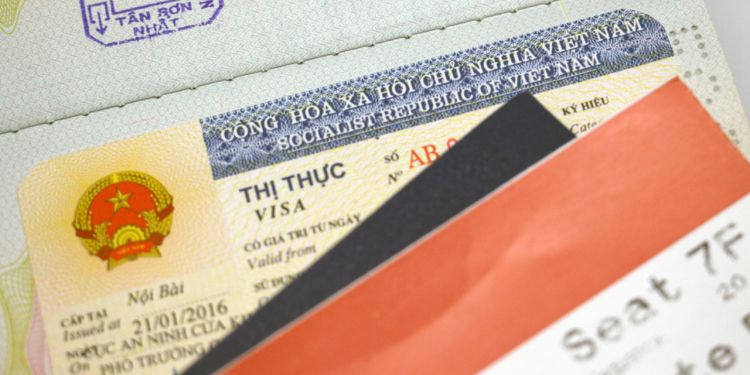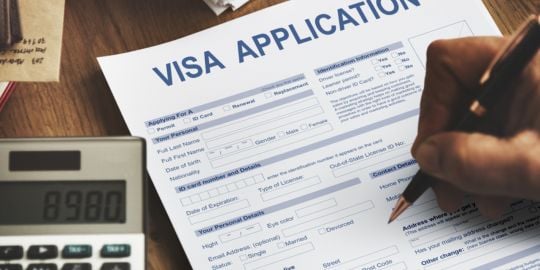Visas for Vietnam

If you are only planning on having a short stay in Vietnam, you can apply online for a tourist visa, preferably at least one month before the scheduled date of departure. Your visa will be valid for the length of stay indicated on the application form; typically, this will range from 1-3 months.
Exemptions with visas for Vietnam
Currently, Vietnam offers visa exemptions to citizens of 25 countries. South East Asia citizens, mainly those from Thailand, Malaysia, or Cambodia, are permitted to stay for up to 30 days without a visa of any kind. Philippino citizens receive a unique 21-day visa exemption. The UK and numerous members of the European Union were awarded 45-day visa exemptions as of August 2023.
Citizens of the following 80 countries are eligible to apply for Vietnam's e-visa:
- Andorra
- Argentina
- Armenia
- Australia
- Austria
- Azerbaijan
- Belarus
- Belgium
- Bosnia and Herzegovina
- Brazil
- Brunei
- Bulgaria
- Canada
- Colombia
- Croatia
- Cuba
- Cyprus
- Czech Republic
- Chile
- China (including Hong Kong and Macau passports)
- Denmark
- Estonia
- Fiji
- Finland
- France
- Georgia
- Germany
- Greece
- Hungary
- Iceland
- India
- Ireland
- Italy
- Japan
- Kazakhstan
- Latvia
- Liechtenstein
- Lithuania
- Luxembourg
- Macedonia
- Malta
- Marshall Islands
- Mexico
- Micronesia
- Moldova
- Monaco
- Montenegro
- Mongolia
- Myanmar
- Nauru
- Netherlands
- New Zealand
- Norway
- Palau
- Panama
- Papua New Guinea
- Peru
- Poland
- Portugal
- Philippines
- Qatar
- Romania
- Russia
- Salomon Islands
- San Marino
- Serbia
- Slovakia
- Slovenia
- South Korea
- Spain
- Sweden
- Switzerland
- Timor Leste
- United Arab Emirates
- United Kingdom
- United States of America
- Uruguay
- Vanuatu
- Venezuela
- Western Samoa
Types of visas for Vietnam
To avoid any complications or unexpected problems during your travel to Vietnam, it is prudent to understand the different types of visas in Vietnam. Below, we will proceed to help you understand these different categories. Although there are more than 20 different types of visas for Vietnam, there is no need to feel overwhelmed. The parameters of each category are fairly straightforward.
The two most important criteria are the purpose of the visit and validity. New immigration regulations - Law No. 51/2019/QH14 - came into place in August 2023. Since then, Vietnamese visas have been categorized into 21 main types, with the most common types of visas including:
- Tourist visa (DL);
- Business visa (DN1, DN2);
- Student/internship visa (DH);
- Investor Visa (DT1, DT2, DT3, DT4);
- Working visa (LD1 – LD2).
- 1-month single entry visa;
- 1-month multiple entry visa;
- 3-month single entry visa;
- 3-month multiple entry visa.
Tourist visa
This type of visa is for visitors planning to come to Vietnam for leisure purposes only. It does not permit the recipient to conduct any business matters during their stay. The tourist visa is divided into four main subcategories:
- DT1 – to be granted to foreign investors in Vietnam and representatives of foreign organizations investing in Vietnam with a capital contribution of at least VND100 billion or investing in the business fields and areas of investment incentives decided by the Vietnam Government. It is valid for up to 5 years.
- DT2 – to be granted to foreign investors in Vietnam and representatives of foreign organizations investing in Vietnam with a capital contribution of VND50 – under VND100 billion, or investing in the business fields of investment encouragement decided by the Vietnam Government. It is valid for up to 5 years.
- DT3 – to be granted to foreign investors in Vietnam and representatives of foreign organizations investing in Vietnam with a capital contribution of VND3 – under VND50 billion. It is valid for up to 3 years.
- DT4 – to be granted to foreign investors in Vietnam and representatives of foreign organizations investing in Vietnam with a capital contribution of less than VND3 billion. Valid for up to 12 months.
Although booking a 3-month visa is completely feasible, the new legislation states that visitors on tourist visas will only be given a 30-day stamp on arrival. This means that should you wish to extend your stay, you will be required to visit the immigration office for another stamp.
Business visa
This is the second most common type of visa for Vietnam, and it is divided into two categories: DN1 and DN2.
The DN1 visa is offered to those who are coming to Vietnam to work with other organizations and businesses. For example, IT consultants may reside in Vietnam on these visas.
The DN2 visa is given to foreigners who come to Vietnam to establish their own business or commercial presence of some kind. Additionally, those who offer a particular service or perform specific roles under international treaties in collaboration with Vietnam would also qualify for this type of visa.
As with the tourist visas, foreigners arriving on Vietnam business visas will have numerous options in terms of duration. Citizens of the United States also have the option of purchasing the Vietnam 1-Year Multiple Entry Visa.
Student visa
For foreign visitors about to attend a university course in Vietnam, a student visa is the best option. Students must apply for their visa after being accepted at the university. You will need to include a copy of the university acceptance in your visa application. Once approved, it will grant the student a 12-month visa and a DH temporary resident card. The student's passport must also be valid for at least one month after the 12 months of study.
Investors visa
The investor visa is divided into four subcategories, and these classifications are based on the amount of capital the investor intends to bring:
Working visa
This type of visa is often acquired by ESL teachers coming to Vietnam. It grants the holder the right to live and work in Vietnam for a period of up to 2 years. Furthermore, renewing this type of visa is a relatively easy process. The work visa is separated into two main types:
- The LD1 visa is given to foreigners who possess a work permit exemption certificate.
- The LD2 visa is granted to those who need a work permit to legally work in Vietnam.
Obtaining this type of visa is simply a matter of requesting that your prospective employer arrange an LD approval letter. This must be done via the Vietnam Immigration Department. This document will then need to be stamped upon your arrival in Vietnam.
If you aren't currently in possession of a work permit or written confirmation of work permit exemption, you should consider applying for a business visa first. Obtaining a work visa will be subject to two kinds of fees. The first will be for the visa approval letter. The second is the stamping fee. If you are arriving in Vietnam to work at a school or language center, your HR department should handle all of this paperwork for you.
Other types of visa
As mentioned earlier, Vietnam has several kinds of visas for foreign visitors.
The diplomatic visas are awarded to foreign nationals at the behest of Vietnamese government officials of high rank or Vietnamese ministries. Visas of this nature are also given to consulate personnel liaising with Vietnamese authorities. These visas are not subject to any fees and are valid for a period of up to 12 months.
Other niche categories of visas include the Lawyer Visa (LS - max 5 years), Journalists with short-term residence in Vietnam (PV2 - 1 year), and family visits or other purposes for Vietnamese nationals (VR - 6 months).
Arrange your upcoming Vietnam visa
Luckily, there are hundreds of reputable companies situated in Vietnam that can help you with this process. The most common method of entry into Vietnam is by visa on arrival. This is simply a process of punching in your details on the Vietnam visa official website.
Before arranging your visa, make sure that your passport is valid for at least six months from the date of your arrival in Vietnam. Additionally, your passport should have at least two blank pages available. Vietnamese immigration officers are meticulous during their documentation inspection and will not approve passports with any damage, including refusing to admit visitors because of torn pages or other wear and tear damages.
Fees for visas and approval letters vary as some agencies include a modest commission. A multiple-entry visa is likely to cost $ 50 in the region. If you arrive via land border entry, you will need to complete a two-page form at immigration and have two passport photos plus the USD 25 stamping fee ready. When you arrive at the airport, you should have your arrival letter and visa printed from the online process. When you are departing from the previous airport, you will be asked to show these documents before being allowed to board.
Enjoy your stay in Vietnam
Vietnam is generally a safe country, but it is still advisable to remain on your guard. Arranging visas is one thing, but remember that Vietnam also has countless options for commuting. While here, you will be able to rent motorbikes or book taxis at exceptional rates.
Useful links:
Vietnam Visa Types and Validity – 20 Main Categories 2023
Vietnam Visa Types and Validity – 20 Main Categories 2023
Vietnam Extends E-visa Validity to 3 Months | New eVisa Policy.
Ordinance On Entry, Exit And Residence Of Foreigners In Vietnam






